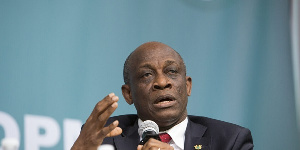 Seth Terkper, former Finance Minister
Seth Terkper, former Finance Minister
Former Deputy and Substantive Finance Minister under the Mills-Mahama administration says he is happy to see the Nana Akufo-Addo administration begin to take some of the initiatives launched by his predecessors seriously. These apply particularly to petroleum-based funds under the PRMA and the role of ESLA in resolving the Banking Sector crisis.
In an interview with journalists, the former minister – who has not hesitated to defend these policies – was quick to add that some of the ideas under the PRMA emanated from the Kufuor administration.
Recently, Minister for Finance Ken Ofori-Atta charged the new GIIF Board to secure funds for various government projects. As Mr. Terkper recalled: “Parliament passed the GIIF law (Act 877) in 2014 and used US$250million from that year’s Sovereign Bond as GIIF seed capital.
“The Act requires the Ministry of Finance (MOF) to pay 15 percent of Annual Budget Funding Amount (ABFA) petroleum revenues and VAT revenue from the rate increase (15 percent to 17.5 percent) into GIIF’s account annually.” Despite fiscal challenges, the Mahama regime started to comply with the Act.
However, from 2017 to 2020, the Nana Akufo-Addo government failed to allocate the ABFA funds and repealed the VAT Act to direct all VAT revenues into the Consolidated Fund for general use. When pressed, Mr. Terkper said he was “not surprised that the total GIIF investment to date is only US$290million, as indicated by the minister”.
GIIF was not an original PRMA Fund, but the Mahama regime proposed the Act to address concerns that the oil revenues were not translating into substantive infrastructure projects. Hence, “GIIF’s first investment was in KIA Airport Terminal 3 while a Parliament Resolution vested the Airport City 2 land to GIIF. Under a Build, Operate and Transfer (BOT) plan, GIIF was to take over development of the land in 15 years – but the project has stalled”.
Another reason for GIIF is to get a Special-Purpose Vehicle (SPV) as part of Ghana’s Sovereign Wealth Fund (SWF) structure, to borrow for these ‘self-financing’ commercial projects – that will not burden the public debt. Mr. Terkper noted further, “We must be aware of warnings from the IMF, World Bank and others that Ghana’s contingent and quasi-fiscal liabilities keep rising as part of its unsustainable debt situation.
“It would be unfortunate for government to use GIIF to worsen this sovereign risk – as has happened already to ESLA and GETFund. The best way to avoid this is for Parliament to resist an amendment of the Act, which obliges government to allocate only a small percentage for social projects – in order not to use GIIF to complement the Consolidated Fund for Budget purposes”. Given these criteria, he is of the view that most Agenda 101 projects may not qualify if we adhere to this plan.
Reducing Price Stabilisation & Recovery Levy (PSRL) to zero
Mr. Terkper welcomed the recent reduction of the PSRL to zero (0) for 2 months to alleviate the impact of increases in pump prices on vehicle owners and commuters. However, he added that: “The zero-rating could not be implemented immediately because it would have breached the prerogative of Parliament to impose or remit taxes under Chapter 13 of the 1992 Constitution”.
As the NPA Statement notes, the PSRL – which is currently sixteen pesewas per litre (GHp16/lt) on petrol, fourteen pesewas per litre (GHp14/Lt) on diesel, and fourteen pesewas per kilogramme (GHp14/Kg) on LPG are (to be) zeroed to cushion consumers. It explains further that the NPA will work with the Ministries of Energy and Finance on quickening the legislative processes so as to give immediate effect to this directive by the president.
However, in his reaction Mr. Terkper notes that “Originally, the PSRL was imposed in 2015 under the ESLA (Act 899) at GHp12 per litre on petrol, GHp10 Diesel and GHp10 per kg on LPG”. Hence, it is under an ESLA (Amendment) Act 899, that Parliament increased the sub-levies to levels stated in the NPA Statement.
Besides the zero-rating coming with a two-month sunset clause, the Statement does not make it apparent that the PSRL was increased in 2019. “Together with the Road Fund Levy, the PSRL is a tax under Section 5 of the 2015 ESLA Act and was increased by Parliament under ESLA (Amendment) Act, 2019 (Act 997)—as were the reductions by Parliament of the Public Lighting and National Electrification Scheme levies under the ESLA (Amendment) Act, 2017 (Act 946)”.
It is Schedule 1 of the Act that explains it is imposed “as a buffer for under-recoveries or subsidies to stabilise petroleum prices for the consumer”. However, the bulk of 2019 increases will remain intact because of lacking fiscal space, which makes it impossible to remove the ‘nuisance’ tax that now supports vital fiscal programmes like addressing the banking sector crisis.
The former Finance Minister also explained his second point on a missed fiscal opportunity under the current administration: “Since Ghana had become a lower Middle-Income Country (MIC), the Mahama regime followed the Emerging Market (EM) and advanced economies in using part of the PSRL revenues to start a Strategic Stock Scheme for the country”.
Under the Scheme, government agencies (i.e., MOF, TOR, BOST and GOIL) “started a pilot to buy final petroleum products at low (global) prices and then sell as prices rise to dampen the impact of pump and utility prices”. The former administration used the scheme to good effect by stabilising the consumer price through 2016, when petrol queues stopped forming, despite modest price increases and price liberalisation. Despite the price of crude oil continuing to be low and with 3 oilfields, the NPP seems to have stopped the scheme in 2017.